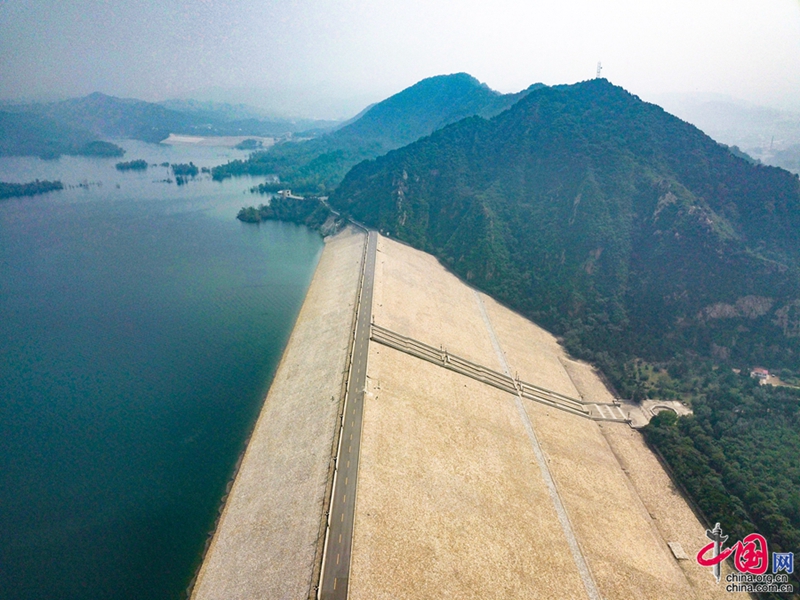As of 21:48 on Oct. 18, a total of 4 billion cubic meters of water has been transferred to Beijing from the Danjiangkou Reservoir in central China's Hubei province, and this source of stable-quality water has benefitted more than 12 million Beijing residents, according to the Beijing Office of the South-to-North Water Diversion Project Construction Committee.

Miyun Reservoir in northern Beijing. [File photo]
A record amount of water transferred to Beijing
The Central Route (Phase I) of the South-to-North Water Diversion Project was completed on Dec. 12, 2014. On the 27th of that month, water from the Danjiangkou Reservoir entered Beijing. Once the project started operation, the Beijing Office standardized and refined management approaches to guarantee its steadily improving performance.
From the end of 2014, the diversion project has operated safely in Beijing for 1,392 consecutive days, and the maximum capacity of water entering the city reached 3.71 million cubic meters a day.
The water supply has been stable, and the project has achieved the desired results. The total water supply from the project was recorded as 703 million cubic meters in 2014-15, followed by 1.11 billion cubic meters in 2015-16 and 1.03 billion cubic meters in 2016-17. As of Oct. 4 this year, the water supply reached a yearly record-breaking 1.11 billion cubic meters.
Based on the current volume of water flow, by Oct. 31, the amount of water transferred will exceed 1.2 billion cubic meters this year.
70 percent of transferred water for household use
Following the guidelines on overall planning of water consumption and control, the Beijing municipal government proposed a refined management scheme to make the most of the diversion project. The government advocates saving water, controlling pollution, and protecting the environment instead of totally relying on the project, and stresses the necessity for metering, tracking and monitoring in the whole water diversion process.
Supplying water for domestic use is the priority of the diversion project. Among the 4 billion cubic meters of water transferred to Beijing, 2.67 billion cubic meters was directed to water works, accounting for nearly 70 percent of the total amount.
The rest of the water was to serve the strategic reserve purpose. A total of 1.01 billion cubic meters of water was delivered to the reservoirs in suburban areas of Beijing, or stored as emergency water sources, while the last 322 million cubic meters was used to replenish the rivers and lakes in central Beijing, ensuring water supply in the capital.
Stable quality wins positive feedback
According to the Beijing Office of the project, the 4 billion cubic meters of transferred water greatly increased the total amount of water resources in Beijing, ensured the security of urban water supply, and improved water conditions for urban residents. It also led to a valuable water conservation period for the city.
Water from the diversion project shows stable quality and enjoys positive feedbacks from the urban residents of Beijing, who describe the water as containing less scale and presenting a slightly sweet flavor. The municipal government launched a project to replace the outdated water supplying facilities to benefit more than 1 million residents. Water supply infrastructure, such as the Shijingshan Water Works, the Yizhuang Water Works, and the Daxing International Airport Water Works, will further expand the impact of the water diversion project.
Through the gradual shutdown of privately-excavated wells, Beijing effectively promoted the conservation and restoration of underground water resources, and curbed the declining trend of underground water levels and the formation of funnel areas. By the end of September, the depth of underground water had increased 2.12 meters, compared with the same time last year.
Auxiliary projects to secure water supply in Beijing
Beijing built a prototype network to ensure the flow of the water transferred from the water diversion project, as well as a water supply loop line along the West 4th Ring Road and the East, South and North 5th Ring Roads. Together with the East-West water supply branch lines and the Miyun Reservoir, the loop line will help secure water supply in Beijing.
The Beijing Urban Master Plan (2016-2035) mandates that "by 2020, the per capita water resources of Beijing will increase to about 185 cubic meters, and by 2035, about 220 cubic meters." To realize this, the Beijing Office of the water diversion project is vigorously promoting the construction of key projects, such as the Daxing branch line and the Hexi branch line.
As an auxiliary project to the water diversion project, the Daxing branch line can be connected to the auxiliary project in neighboring Hebei province. Once completed, the Daxing branch line will not only serve the water demand in the Daxing International Airport area, but also integrate into the water supply network of the Beijing-Tianjin-Hebei region, further enhancing water supply safety in the region.